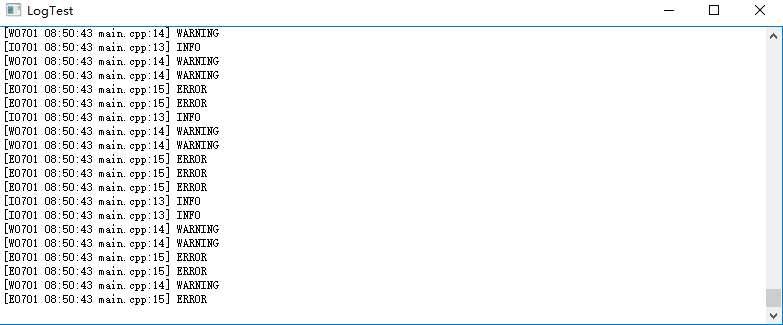qt里面用log4qt日志库
Posted wushuang443
tags:
篇首语:本文由小常识网(cha138.com)小编为大家整理,主要介绍了qt里面用log4qt日志库相关的知识,希望对你有一定的参考价值。
1,下载链接,
项目地址:GitHub - devbean/log4qt: Logger for Qt.
注意:log4qt网上有多个项目,比如Log4Qt - Logging for C++/Qt download | SourceForge.net(已迁移到GitHub - MEONMedical/Log4Qt: Log4Qt - Logging for the Qt cross-platform application framework),此项目用的人多,但是多个版本下载下来测试,都编译不过去,然后才找到上面那个项目,没有问题。
2,使用方式
2.1编译成第三方库,在此不做介绍,自行百度
2.2 把它作为自己源代码继承进来
# 定义所需的宏
DEFINES += LOG4QT_LIBRARY
## 定义 Log4Qt 源码根目录
LOG4QT_ROOT_PATH = $$PWD/Log4Qt-master
# 指定编译项目时应该被搜索的 #include 目录
INCLUDEPATH += $$LOG4QT_ROOT_PATH/src \\
$$LOG4QT_ROOT_PATH/src/log4qt \\
$$LOG4QT_ROOT_PATH/include \\
$$LOG4QT_ROOT_PATH/include/log4qt
## 将 Log4Qt 源代码添加至项目中
include($$LOG4QT_ROOT_PATH/src/log4qt/log4qt.pri)
include($$LOG4QT_ROOT_PATH/build.pri)
include($$LOG4QT_ROOT_PATH/g++.pri)
3,代码使用,比如
//Log4Qt的使用
QString outpath = QCoreApplication::applicationDirPath() + "/xxx.log";
QString configPath = QApplication::applicationDirPath() + "/xxx.conf";
if(QFile::exists(outpath) && QFile::exists(configPath))
QFile::remove(outpath);
QFile::remove(configPath);
if(!QFile::exists(configPath))//不存在配置文件 创建默认配配置文件
QSettings configSet(configPath,QSettings::IniFormat);
configSet.setIniCodec("UTF-8");
configSet.setValue("log4j.rootLogger",QStringList()<<"DEBUG"<<"A2");
//file
//configSet.setValue("log4j.logger.A2","A2");
configSet.setValue("log4j.appender.A2","org.apache.log4j.FileAppender");
configSet.setValue("log4j.appender.A2","org.apache.log4j.RollingFileAppender");
configSet.setValue("log4j.appender.A2.File",outpath);
configSet.setValue("log4j.appender.A2.AppendFile","true");
configSet.setValue("log4j.appender.A2.MaxFileSize","4096KB");
configSet.setValue("log4j.appender.A2.MaxBackupIndex","3");
configSet.setValue("log4j.appender.A2.layout","org.apache.log4j.PatternLayout");
configSet.setValue("log4j.appender.A2.layout.ConversionPattern","%dyyyy-MM-dd HH:mm:ss %m%n");
configSet.sync();
else// 存在修改日志保存路径
QSettings configSet(configPath,QSettings::IniFormat);
configSet.setIniCodec("UTF-8");
configSet.setValue("log4j.appender.A2.File",outpath);
configSet.sync();
Log4Qt::PropertyConfigurator::configure(configPath);
Log4Qt::LogManager::setHandleQtMessages(true);
qDebug("start used log4qt!");
Qt自定义控件之日志控件
摘要
一般的应用程序都需要在界面上显示日志信息, glog是google的轻量级日志库,本文结合glog,实现了一个简单的线程安全的日志控件。
正文
关于glog的使用,网上有好多介绍的资料,本文参考里面列出了一些,这里就不介绍了。下面列出日志控件的实现要点:
1、日志控件继承自google::LogSink,重新实现其virtual send()函数,自定义日志处理逻辑。
2、调用google::AddLogSink(this),将日志控件添加到glog的转发容器中;
3、日志控件使用QplainTextEdit来显示日志信息;
4、日志控件维护一个线程安全的日志的vector,使用定时器定时从vector中取出日志,并在QplainTextEdit中显示;
本文代码在vs2015和qt5.7.1的64位编译下进行测试。
下载地址:https://github.com/binbinneu/qt_practice
实现代码如下:
class LogWidget : public QWidget, public google::LogSink { Q_OBJECT; public: LogWidget(QWidget *parent = 0); virtual ~LogWidget(); public: virtual void send(google::LogSeverity severity, const char* full_filename, const char* base_filename, int line, const struct ::tm* tm_time, const char* message, size_t message_len); public Q_SLOTS: void refresh(); private: QPlainTextEdit *log_widget_; QTimer timer_; std::mutex mutex_; typedef std::pair<std::string, google::LogSeverity> MessageType; std::vector<MessageType> message_vec_; const int MAXIMUM_BLOCK_COUNT; const int REFESH_TIME; };
LogWidget::LogWidget(QWidget *parent /*= 0*/) : QWidget(parent), MAXIMUM_BLOCK_COUNT(10000), REFESH_TIME(100) { QHBoxLayout *layout = new QHBoxLayout(); layout->setMargin(0); setLayout(layout); //采用QPlainTextEdit显示日志信息 log_widget_ = new QPlainTextEdit(this); log_widget_->setMaximumBlockCount(MAXIMUM_BLOCK_COUNT); log_widget_->setReadOnly(true); layout->addWidget(log_widget_); //定时器,定时刷新日志 QObject::connect(&timer_, SIGNAL(timeout()), this, SLOT(refresh())); timer_.start(REFESH_TIME); //添加到glog的转发容器中 google::AddLogSink(this); } LogWidget::~LogWidget() { timer_.stop(); QObject::disconnect(&timer_, SIGNAL(timeout()), this, SLOT(refresh())); google::RemoveLogSink(this); } void LogWidget::refresh() { std::lock_guard<std::mutex> lock(mutex_); if (!message_vec_.empty()) { for (const auto &message : message_vec_) { log_widget_->appendPlainText(QString::fromLocal8Bit(message.first.c_str())); } } message_vec_.clear(); } void LogWidget::send(google::LogSeverity severity, const char* full_filename, const char* base_filename, int line, const struct ::tm* tm_time, const char* message, size_t message_len) { std::ostringstream message_stream; message_stream.fill(‘0‘); message_stream << "[" << google::LogSeverityNames[severity][0] << std::setw(2) << 1 + tm_time->tm_mon << std::setw(2) << tm_time->tm_mday << ‘ ‘ << std::setw(2) << tm_time->tm_hour << ‘:‘ << std::setw(2) << tm_time->tm_min << ‘:‘ << std::setw(2) << tm_time->tm_sec << ‘ ‘ << full_filename << ‘:‘ << line << "] "; message_stream << std::string(message, message_len); std::string message_str = message_stream.str(); std::lock_guard<std::mutex> lock(mutex_); message_vec_.push_back(MessageType(message_str, severity)); }
测试代码:
void thread_fun() { for (int i=0; i<1000000; ++i) { std::this_thread::sleep_for(std::chrono::milliseconds(100)); LOG(INFO) << "INFO"; LOG(WARNING) << "WARNING"; LOG(ERROR) << "ERROR"; } } int main(int argc, char *argv[]) { QApplication a(argc, argv); LogWidget w; w.show(); QString log_path = QCoreApplication::applicationDirPath() + "/"; google::InitGoogleLogging(argv[0]); google::SetLogDestination(google::INFO, log_path.toStdString().c_str()); google::SetLogDestination(google::WARNING, log_path.toStdString().c_str()); google::SetLogDestination(google::ERROR, log_path.toStdString().c_str()); google::SetLogDestination(google::FATAL, log_path.toStdString().c_str()); for (int i=0; i<10; ++i) { std::thread t(thread_fun); t.detach(); } int b = a.exec(); google::ShutdownGoogleLogging(); return b; }
输出结果:

参考
1、http://blog.csdn.net/breaksoftware/article/details/51363353
2、http://www.cnblogs.com/davidyang2415/p/3861109.html
以上是关于qt里面用log4qt日志库的主要内容,如果未能解决你的问题,请参考以下文章